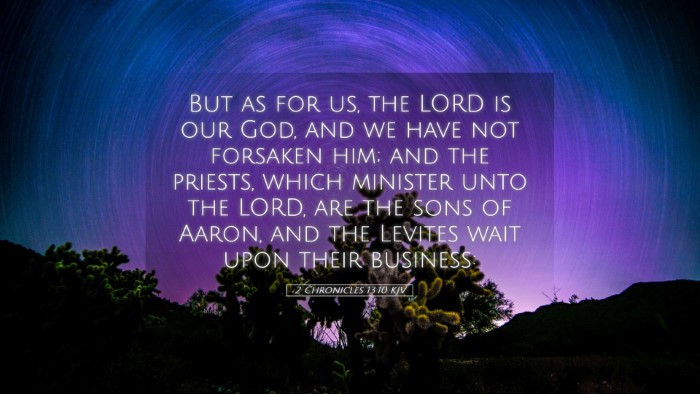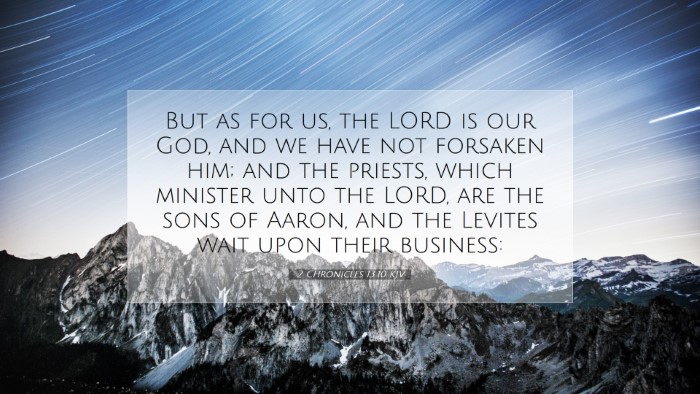Commentary on 2 Chronicles 13:10
This passage falls within a larger narrative concerning the divided kingdoms of Israel and Judah, specifically highlighting the reign of Abijah, King of Judah. The verse reads:
“But as for us, the LORD is our God, and we have not forsaken Him: and the priests which minister unto the LORD are the sons of Aaron, and the Levites wait upon their business.” - 2 Chronicles 13:10
Contextual Overview
The historical context of this verse is critical for understanding its significance. Abijah, the son of Rehoboam and grandson of Solomon, became king of Judah during a tumultuous period marked by the schism between the tribes of Judah and Israel.
Insights from Public Domain Commentaries
- Matthew Henry:
Henry underscores the theological assertion made by Abijah in this verse. He highlights that the declaration of loyalty to Yahweh not only reinforces the Davidic line's divine right to rule but also serves as a contrast to the sins of Jeroboam, who led Israel into idol worship.
- Albert Barnes:
Barnes points out that Abijah's statement reflects a commitment to the Levitical priesthood, which was a central part of the worship system established by God. By emphasizing that the priests are the sons of Aaron, it affirms the continuation of the covenantal relationship that God had with His people through priestly mediation.
- Adam Clarke:
Clarke elaborates on the meaning of 'waiting upon their business,' indicating the responsibilities and roles of the Levites in the temple service. He compares this labor of worship to the duties of Christians today, highlighting the importance of community worship and order in serving God.
Theological Implications
The verse serves several theological themes relevant to contemporary faith practice:
- Covenant Loyalty:
Abijah’s proclamation of fidelity to God has profound implications. It serves as a reminder to believers today about the importance of covenant loyalty to God, not just in personal devotion but also in communal worship.
- The Role of the Priesthood:
The emphasis on the Aaronic priesthood underlines the ongoing significance of intercession and worship in the life of God’s people. This reflects the New Testament understanding of Christ as our mediator (Hebrews 7:24-25).
- Divine Authority and Leadership:
Given the political landscape between Judah and Israel, this verse stresses the importance of divine sanction in leadership. This serves as a warning against earthly authority that deviates from God’s design.
Historical Reflections
From a historical perspective, the conflict between Abijah and Jeroboam is illustrative of the broader theological conflicts that arise in periods of divided allegiance. As Abijah rallies the armies of Judah, he reminds both Israel and his own people of the foundational truths about their identity.
Practical Applications for Today
For modern pastors, students, and theologians, the teachings derived from 2 Chronicles 13:10 can be transformative:
- Encouragement for Leadership:
Leaders must remind their congregations of their commitment to God and the importance of maintaining purity in worship, echoing Abijah’s reminder not to forsake the Lord.
- Call to Community:
As the Levites had specific roles, congregations should recognize and utilize each member’s gifts for the glory of God’s kingdom.
- Call to Fidelity:
In a world often defiant against the principles of God, this verse calls us to stand firm and disavow the idolatries of contemporary society.
Conclusion
2 Chronicles 13:10 stands as a powerful affirmation of Yahweh's supremacy, the importance of priestly service, and the necessity of covenant fidelity. In a divided world, this passage provides essential insights into what it means to remain loyal to God's calling. Abijah’s declaration is not merely historical; it echoes through the ages, challenging us to reflect on our devotion to God amidst competing allegiances.


